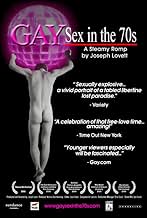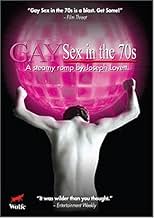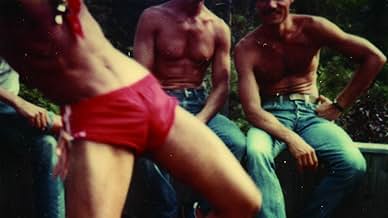Adicionar um enredo no seu idiomaA chronicle of gay culture in New York during the post-Stonewall, pre-AIDs era.A chronicle of gay culture in New York during the post-Stonewall, pre-AIDs era.A chronicle of gay culture in New York during the post-Stonewall, pre-AIDs era.
- Prêmios
- 2 vitórias e 1 indicação no total
Robert Alvarez
- Self - Hand in Hand Film Productions
- (as Bob Alvarez)
Lawrence Mass
- Self - Addiction Specialist, Writer
- (as Lawrence Mass M.D.)
Ken Unger
- Self - Internist
- (as Ken Unger M.D.)
Joseph F. Lovett
- Self
- (não creditado)
Bette Midler
- Self
- (cenas de arquivo)
- (não creditado)
Avaliações em destaque
10reidwill
This film is phenomenal. Although I didn't experience this moment in history, the film takes you back both elegantly and poignantly. Through incredible footage, photos, and other memorabilia, I relived this incredible period of time. The interviews and personal stories shed an unbiased light on an important era. The film asks the questions - how did this moment in time influence the shape of the gay community for decades to come? Was this just one long hedonistic party or did this help create a sense of gay community? There are a lot of documentaries out there, but this is definitely one not to miss.
Reid Williams
Reid Williams
For those unfamiliar with the topic, this documentary offers good information. For those already familiar with, or who lived through or participated in it, the film's a trip down memory lane.
Joseph Lovett has assembled some period footage and photo stills to help depict his subject. But the film mostly consists of "talking heads": men in their 60s, sharing personal experiences on the atmosphere, attitudes and action from the 70s. A couple of women in their 30s also offer reflective remarks.
What a rare opportunity for people in the Northeast area of the country to be able to see this film locally, at Cleveland's unique Cinematheque. Not yet available on video or DVD, and rarely shown outside of New York, these Ohio screenings are all the more valuable.
The diverse and appreciative audience was very interested in the subject, and reacted to the humor audibly. While all this is now history, the 70s represents for many a time of liberation, experimentation, exploration and fulfillment. --h/76
Joseph Lovett has assembled some period footage and photo stills to help depict his subject. But the film mostly consists of "talking heads": men in their 60s, sharing personal experiences on the atmosphere, attitudes and action from the 70s. A couple of women in their 30s also offer reflective remarks.
What a rare opportunity for people in the Northeast area of the country to be able to see this film locally, at Cleveland's unique Cinematheque. Not yet available on video or DVD, and rarely shown outside of New York, these Ohio screenings are all the more valuable.
The diverse and appreciative audience was very interested in the subject, and reacted to the humor audibly. While all this is now history, the 70s represents for many a time of liberation, experimentation, exploration and fulfillment. --h/76
There are very few movies that dispense with the coyness and cleverness of a catchy title, and simply tell you flat out what you can expect to see. This is one of them.
Director Joseph Lovett's documentary is kind of like one of those retrospectives you see on VH-1 or the E! Network, only with more naked men, hot explicit sex (well, explicit for a documentary), and snapshots frozen in time that show us visions of a bygone decade, where the Gay Wide World went from draconian repression, to sexual liberation of Bacchanalian proportions, to the next chapter where "the bill came due" for all that excessive indulgence.
No one clucks their tongues or passes judgment, as the interviewees regale us with tales of just how things were back in those days, (although you have to consider that there was some extravagant embellishments here and there.) I was only privy to a taste of the lifestyle of which the subjects speak in this film, and I guess I should be grateful for it, because more than likely it saved my life and the lives of more than a few other people I know. Even back then, in my younger days, I only knew of the stories about Fire Island, the New York-based bars, baths and clubs and the infamous Piers and Trucks through hearsay, and it all sounded fabulous, hedonistic and legendary even as it was happening.
There are touches of the ominous, though, and it certainly doesn't shy away from the dark side of all that "jazz." There were risks other than STD's, and in pursuit of ultimate bliss, there were some who still paid the ultimate price, and that was way before AIDS came to call.
Funny, touching, shocking and sobering all at once, the only drawback is that it isn't the fully rounded account it could be. Maybe Lovett can find a way to extend this into a series and capture more accounts of the shock waves that spread out into other parts of the country, from the "epicenter of the gay universe" as someone in the doc describes the Big Apple. New York and San Francisco were important touchstones of gay culture, but they were not the 'Alpha and Omega' of the Seventies' sexual revolution.
At the very least, it is an important historical record that a new generation can learn from, for those who think that "Stonewall" is just another place in the mall where you can buy acid-washed jeans.
And on a sadder note, maybe the reason why it hasn't been possible to film a more complete history of "Gay Sex in the Seventies," is because many of the eyewitnesses to this remarkable time in history are no longer here to tell about it. I certainly hope that isn't the case.
Director Joseph Lovett's documentary is kind of like one of those retrospectives you see on VH-1 or the E! Network, only with more naked men, hot explicit sex (well, explicit for a documentary), and snapshots frozen in time that show us visions of a bygone decade, where the Gay Wide World went from draconian repression, to sexual liberation of Bacchanalian proportions, to the next chapter where "the bill came due" for all that excessive indulgence.
No one clucks their tongues or passes judgment, as the interviewees regale us with tales of just how things were back in those days, (although you have to consider that there was some extravagant embellishments here and there.) I was only privy to a taste of the lifestyle of which the subjects speak in this film, and I guess I should be grateful for it, because more than likely it saved my life and the lives of more than a few other people I know. Even back then, in my younger days, I only knew of the stories about Fire Island, the New York-based bars, baths and clubs and the infamous Piers and Trucks through hearsay, and it all sounded fabulous, hedonistic and legendary even as it was happening.
There are touches of the ominous, though, and it certainly doesn't shy away from the dark side of all that "jazz." There were risks other than STD's, and in pursuit of ultimate bliss, there were some who still paid the ultimate price, and that was way before AIDS came to call.
Funny, touching, shocking and sobering all at once, the only drawback is that it isn't the fully rounded account it could be. Maybe Lovett can find a way to extend this into a series and capture more accounts of the shock waves that spread out into other parts of the country, from the "epicenter of the gay universe" as someone in the doc describes the Big Apple. New York and San Francisco were important touchstones of gay culture, but they were not the 'Alpha and Omega' of the Seventies' sexual revolution.
At the very least, it is an important historical record that a new generation can learn from, for those who think that "Stonewall" is just another place in the mall where you can buy acid-washed jeans.
And on a sadder note, maybe the reason why it hasn't been possible to film a more complete history of "Gay Sex in the Seventies," is because many of the eyewitnesses to this remarkable time in history are no longer here to tell about it. I certainly hope that isn't the case.
I have seen this film, too, and I was somewhat taken back in time having seen it since it was a complete reenactment of my entire life in New York at that time, and a time capsule of gay like during the 1970s. I was fortunate enough to live through the AIDS era because I has a monogamous relationship at the time, but many of my friends are dead now, and that is the sad part of seeing the film. The scenes from the 70s in the film including the candid interviews made this film worthwhile. I was lucky enough to see it at a special private screening when in new york recently, and I would definitely recommend it to anyone interested in gay history and gay sex from 1969 onward. One aspect of the film discussed the discos and the baths. I remember a time when Manhattan had at least ten active gay bathhouses, from the ten story Man's Country to the sleazy Everard Baths. I went to all of them, and I still have my Continental Baths towel that I bought at Bloomingdales. What memories! I don't live in NYC anymore. I am in Hawaii, but according to this site (BathhouseGuide.com) there are still gay bathhouses operating in the Big Apple. Cheers, Eddie
It was almost deja vu for me, watching what lifestyle was like in those heady days of Gay sex in the 70's.
The thing about it was that it really happened just like that - not only in NYC but around the world! I lived in Perth, Australia and it was all happening here as well! This is a very good archive of a time in history and valuable in today's world.
It was fun to see all the pretty young things in their heyday who are all past middle age, yet knowing that they'd come a long way to get here.
I enjoyed it and highly recommend it to anyone who was around at the time.
The thing about it was that it really happened just like that - not only in NYC but around the world! I lived in Perth, Australia and it was all happening here as well! This is a very good archive of a time in history and valuable in today's world.
It was fun to see all the pretty young things in their heyday who are all past middle age, yet knowing that they'd come a long way to get here.
I enjoyed it and highly recommend it to anyone who was around at the time.
Você sabia?
- CuriosidadesThe film was awarded the GayVN Award for Best Alternative Release of 2006.
- ConexõesFeatured in SexTV: Andre Williams/Gay Sex in the 70s/Jen Davis (2005)
- Trilhas sonorasDo You Wanna Funk?
Written by Sylvester (as Sylvester James) and Patrick Cowley
Published by Sequins at Noon Music & Blue Image Music (BMI)
Performed by Sylvester
Courtesy of Unidisc Music, Inc.
Principais escolhas
Faça login para avaliar e ver a lista de recomendações personalizadas
- How long is Gay Sex in the 70s?Fornecido pela Alexa
Detalhes
- Data de lançamento
- País de origem
- Central de atendimento oficial
- Idioma
- Também conhecido como
- 男.性70
- Locações de filme
- Empresas de produção
- Consulte mais créditos da empresa na IMDbPro
Bilheteria
- Faturamento bruto nos EUA e Canadá
- US$ 249.565
- Fim de semana de estreia nos EUA e Canadá
- US$ 17.357
- 6 de nov. de 2005
- Faturamento bruto mundial
- US$ 249.565
Contribua para esta página
Sugerir uma alteração ou adicionar conteúdo ausente




















